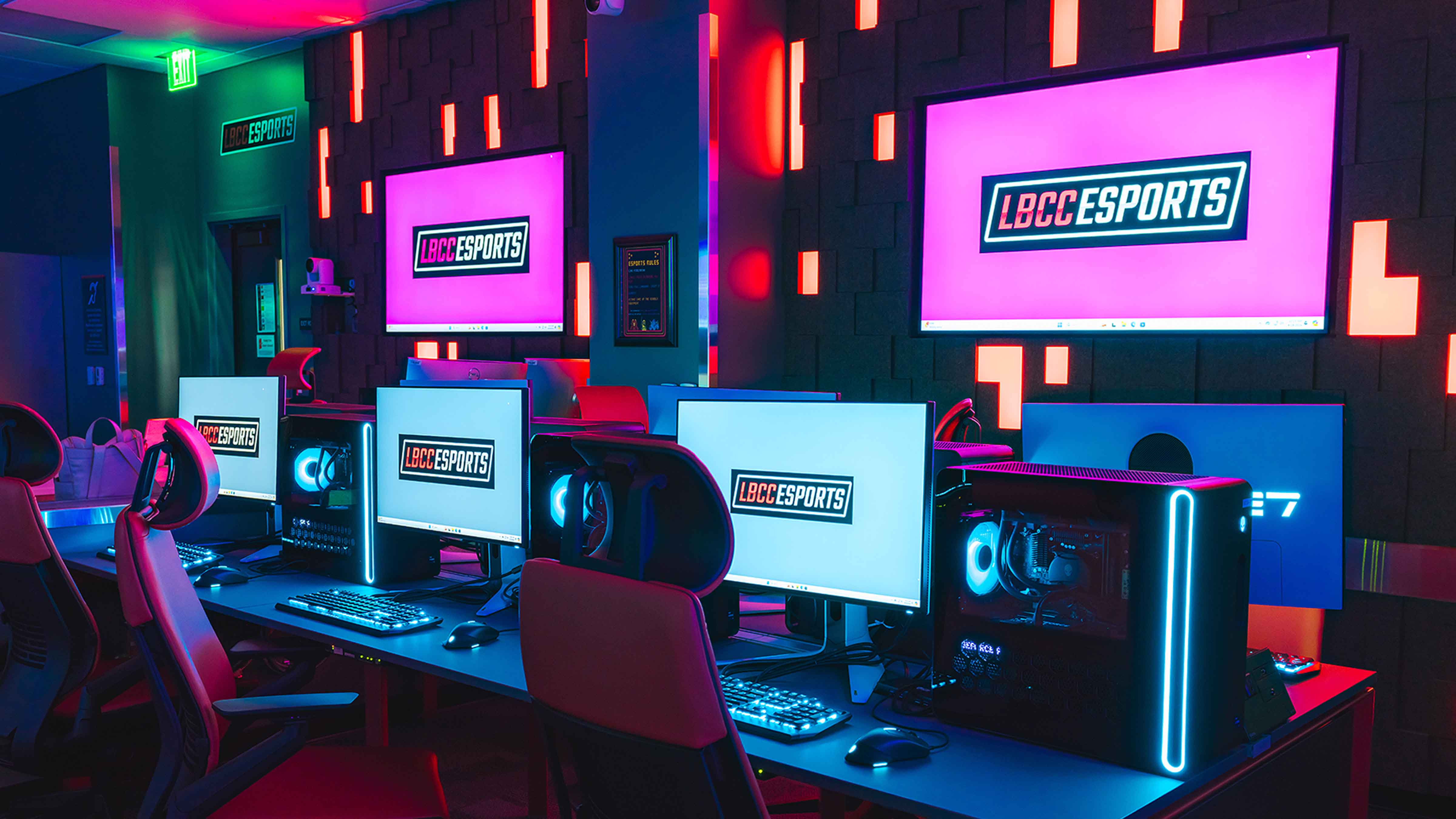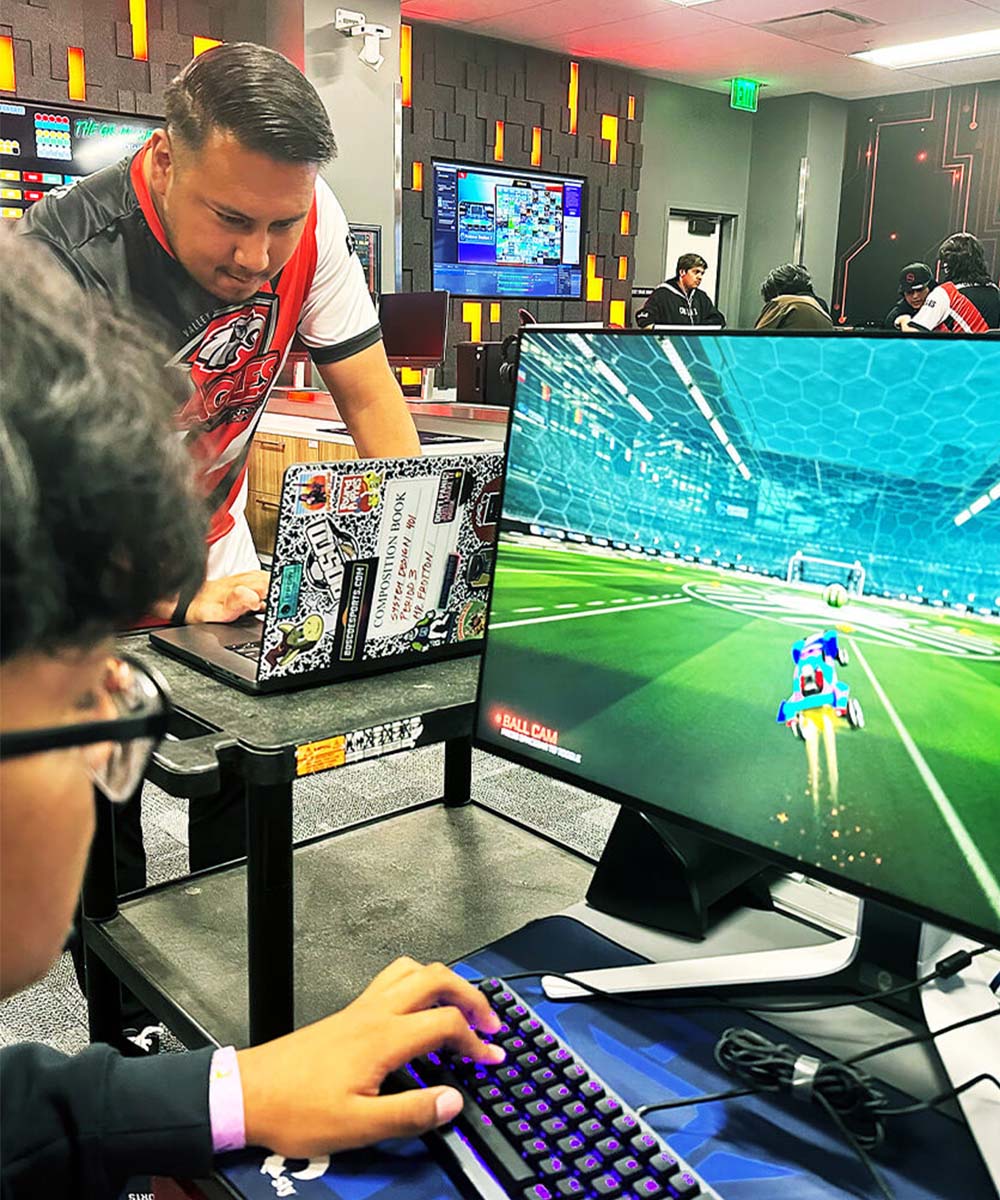Esports: Commitment to Competition
The new E-Sports Lab at Long Beach City College supports gaming and career development.

A daily selection of features, industry news, and analysis for AV/IT professionals. Sign up below.
You are now subscribed
Your newsletter sign-up was successful

If you’ve been paying any attention to college campuses in America, you’ll know that esports is one of the hottest trends in gaming. That's why California’s Long Beach City College (LBCC) officially opened the largest esports lab in Southern California with a ribbon-cutting ceremony in February. The lab was built between March-July 2024 and soft-opened to LBCC students during the Fall 2024 semester.
The $2.3 million LBCC E-Sports Lab is home to 47 Alienware gaming stations, with five teaching stations available to coaches or an instructor to interact with students in competitions or classroom education. The facility also features an optimized lighting system to enhance player comfort and reduce visual fatigue during long gaming sessions, a fully equipped shoutcaster production booth that supports live broadcasting of esports competitions over the internet, and an independent operational infrastructure that provides uninterrupted network and power to the lab at all times.
“We recognize the rapid growth and professionalization of the esports industry,” said Dr. Nohel Corral, LBCC’s EVP of student services. “We see that it's projected to be worth about $6 billion by 2030, and we wanted to ensure that we prepared our students for emerging career opportunities in gaming. The LBCC E-Sports Lab is precisely the kind of modern, cutting-edge learning environment that makes this possible.”
Before the LBCC E-Sports Lab was opened, LBCC’s players had been competing at a local high school since 2022. According to Jeff Connell, LBCC’s associate VP of capital planning, facilities, and operations, the college converted a seminar space and a computer lab space to make room for the esports facility. “We allocated some high value space to this project and made a huge commitment to esports," he added. "As it turns out, this commitment was a very good choice for everyone."
Members of its program also compete in the National Esports Collegiate Conference (NECC) leagues against more than 600 other two-year/four-year colleges and universities nationwide. They take part in team gaming events playing League of Legends, Valorant, Rainbow Six Siege, and Rocket League. Beyond the competitions, LBCC offers a certificate of achievement in multimedia interaction and game design.
Behind the Screens
The LBCC E-Sports Lab was conceptualized by Chris Greenwood and Mayra Aguilar, project managers for LBCC's Educational and Multimedia Technology, with help from Gabe Giangualano, LBCC's director of esports. California’s HPI Architecture, P2S Engineering, and EKC Enterprises played key roles in AV design, room layout, and AV system installation. Extron products were selected for AV switching, signal distribution, and operational control.
“Extron has worked with Long Beach City College for many years supporting all the AV in their learning spaces and classrooms across campus,” explained Kevin Diltz, Extron’s esports business development manager. “We designed the LBCC E-Sports Lab’s AV system to give their space the top competitive edge they desire, plus a facility that can host tournaments on campus, inviting other colleges and universities to come in and compete.”
A daily selection of the top stories for AV integrators, resellers and consultants. Sign up below.
The Alienware gaming stations form the heart of the playing systems, laid out on long tables within the room. “Each of those 47 computers is a video source in the AV system,” Diltz said. “There is an Extron NAV video encoder connected to each of those. Using a touchpanel in the shoutcaster booth, we're able to route video from any of those 47 PCs to any of the large 4K video displays that are around the room to let spectators watch the live gameplay.”

The five coaching station PCs and touchscreen monitors are mounted on roll-around tables at the end of each team table, so they can move around the room. They are also connected to the shoutcast booth using Extron NAV encoders, connected to Extron SMB 114 surface mount connection boxes with Ethernet connections.
As for monitors? There are seven 75-inch 4K displays on the walls around the gaming floor, two 65-inch displays in the shoutcaster booth, a 75-inch display in the reception lobby, and a 55-inch display in the hallway. To add human faces to the esports streams, there are five tracking PTZ cameras covering the players in the lab.
Each of the two Extron MGP 641 xi multi-window processors can individually display up to four source windows on a single screen in a range of layouts. They are also daisy-chained, so up to eight source windows can be seen on any display. Collectively, Extron NAV E 101, NAV E 121, and NAV E 401 D encoders receive AV content and stream through the lab's standard 1 Gbps Ethernet switches to NAV SD 101 scaling decoders. The PoE capability of the Extron components simplified the lab’s wiring and AV installation.
Clearly, there is a lot of equipment and production knowledge associated with streaming LBCC’s esports tournaments to the outside world. But that’s a good thing: “The casting and publishing of the games is a trade and a skill that students develop as part of their education,” said Connell. “They learn by working in the shoutcaster booth, where student operators can access all of the players’ screens and choose which ones to put on the large monitors and stream to the web in real-time. These are valuable, marketable skills.”
More Than 'Wow'
When it comes to hosting esports competitions, there is no doubt that the LBCC E-Sports Lab delivers the "wow" factor to the players, in-room spectators (chairs are brought in to seat them), and online viewers alike. The style and finish of the room is eye-catching and attractive, and the functionality of its AV system ensures that gameplay is smooth, lag-free, and reliable—even during power blackouts!

However, even when esports are not underway, the LBCC Esports Lab is a real boost to this community college. “We started with one class,” Dr. Corral said. “We've now created a second class, and the demand to be part of this course is strong among our students.”
At LBCC, esports is classified as a sport just like football or baseball. “Taking part in esports aids skills development. Student athletes enhance their communication, leadership, teamwork, and strategic thinking abilities when they compete as esports teams,” said Corral. “I’m grateful to Dean Randy Totorp, who originally conceptualized the idea of bringing esports to LBCC, and to Coach Gabriel Giangualano, whose leadership has been instrumental in the team’s early success."
But Corral argues the educational pathways and career preparation that esports provide are what really matter. "In today’s economy, gaming is a growing and strong industry with lots of career opportunities. Meanwhile, with four-year universities creating their esports programs as well, taking part in LBCC’s esports tournaments has led to our students being offered scholarships to four-year universities in addition to careers in technology, broadcasting, and game development," he explained. "Finally, esports creates that sense of belonging for students who may not connect through traditional athletics or student clubs on campus, fostering an inclusive environment that enables students from diverse backgrounds to participate and really excel.”
Clearly, Long Beach Community College is very happy with its LBCC E-Sports Lab and so is Diltz, because a happy client is a repeat client. "The project went spectacularly well," he told SCN. “LBCC is very, very pleased with the outcome of the space. They have already used it for multiple live events to great success. The whole project has been a win-win for everyone involved."
James Careless is an award-winning freelance journalist with extensive experience in audio-visual equipment, AV system design, and AV integration. His credits include numerous articles for Systems Contractor News, AV Technology, Radio World, and TV Tech, among others. Careless comes from a broadcasting background, with credits at CBC Radio, NPR, and NBC News. He currently co-produces/co-hosts the CDR Radio podcast, which covers the Canadian defense industry. Careless is a two-time winner of the PBI Media Award for Excellence.

